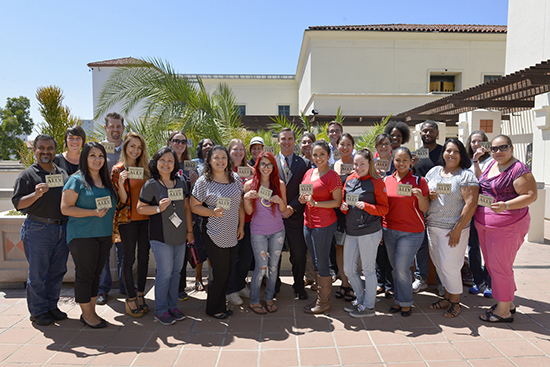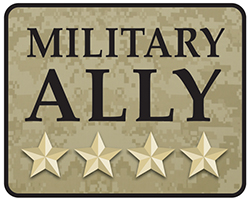@State Mar 2018 - Millitary Ally Program
The Military Ally Program: Forging a Stronger Community Through Dialogue and Engagement
by Erik Good

SDSU's Military Ally program seeks to be the catalyst for positive change in the San Diego region by improving connections between military-affiliates and civilians.

San Diego has long been recognized for its large military presence, spurring on the city's growth during the First and Second World Wars.
But in the modern era, as many service members return from being stationed domestically and abroad, they experience the growing disconnect between military and civilian populations - which has been especially noticeable since the start of the Second Gulf War - as they transition to becoming a student.
This is part of reason why the San Diego State University's Joan and Art Barron Veterans Center - which supports more than 3,200 military-affiliated students - is expanding the reach of its Military Ally program and drawing stronger connections between those who are military-affiliated and those who are civilians.
"There is a division between the military community and the civilian community as a whole, and a lot of it has to do with fewer and fewer people serving. You don't see the connection with American society to the military quite like you used to," said alumnus Todd Kennedy, SDSU's Military & Veterans Program administrator.
That's why the Joan and Art Barron Veterans Center is hosting spring sessions for the Military Ally program, a resource that brings together military-affiliated and civilian students with faculty and staff to engage one another in productive dialogue intended to bridge the gap between these two communities.
Frida Gomez, a SDSU psychology major who is not affiliated with the military, completed a session of the Military Ally program last year. Gomez hopes to work as a clinical counselor on-base in the region and thought the program would be a great opportunity to get to know this unique student population.
"It never hurts to be more aware of all of our student populations here on campus," said Gomez, who learned about the program through her mentor from the Aztec Mentor Program.
"Everyone has their own background, their own story. I think the Military Ally program definitely helps with bridging that gap between our [military-affiliated] students and our civilian students so that we don't feel intimidated to speak to one another," she said.
Citing programs like SafeZones, which encourages an inclusive environment for the LGBTQIA community, and the Brave Project, a training program on sexual violence, Gomez said the Military Ally program is an important addition to the campus dialogue.
"Even though these programs all talk about completely different communities, the impact they have on students is pretty amazing," Gomez said.
Created in April 2015, the Military Ally program is the brainchild of Kennedy and Derek Abbey, the west region director for the Travis Manion Foundation.
The Military Ally program was inspired by the development of the Vet Net Ally program created at California State University, Long Beach and the writings of veteran author Karl Marlantes. While the Vet Net Ally program focused primarily on veterans, Kennedy and Abbey hoped to create a resource for what they refer to as "military-affiliated" students, many of whom are entering higher education for the first time now. This group that includes not just veterans, active duty members and reservists, but military dependents as well, all arriving with specific needs and challenges.
Military-affiliated students often face challenges that traditional college students may not, Kennedy noted.
"There are things that they may have done that most people won't ever do," Kennedy said. "There's sometimes this fear on the veteran's side of the house of 'How do I interact with this civilian population that I've been removed from for however much time?'"
Military-affiliated populations also face popular misconceptions, such as that they all suffer from post-traumatic stress disorder, that entering the service was their only career option and that every service member has seen combat.
"Conversely, from a service members standpoint, some of the things we hear are they view civilians as lazy, slackers and inexperienced," Kennedy said.
By facilitating students to engage in conversation with one another and address misconceptions head on, Kennedy believes that the Military Ally program has the power to not only bridge the gap for civilians to understand the military, but the other way as well.
"We do encourage service members, veterans, dependents, retirees and whomever to go through the program because those conversations also go in the other direction," Kennedy said.
Kennedy said dialogue can also help both groups to understand how the other has experienced different types of challenges and trauma in life. "It's about encouraging the conversations to happen so that we can see things from both perspectives," he said.
Kennedy emphasizes that the Military Ally program isn't training because they're not there to teach. "All we do is provide information. Then we encourage questions and discussions to help break down some of those barriers to reintegrate our society as a whole."
Military Ally sessions are scheduled for Feb. 23, March 7, April 27, and May 25, starting at 8:30 a.m. and ending roughly around noon. You only need to complete one session to become an ally, and those with or without a military connection are encouraged to attend.
Upon completion of a full session of the Military Ally program, students will receive a branded lapel pin. Faculty and staff who complete the program will receive a Military Ally sign to be put in their office, identifying them as a trustworthy resource for military-affiliated students.
For more information or to RSVP for the program, contact Todd Kennedy, the Military & Veterans Program administrator, at [email protected].
